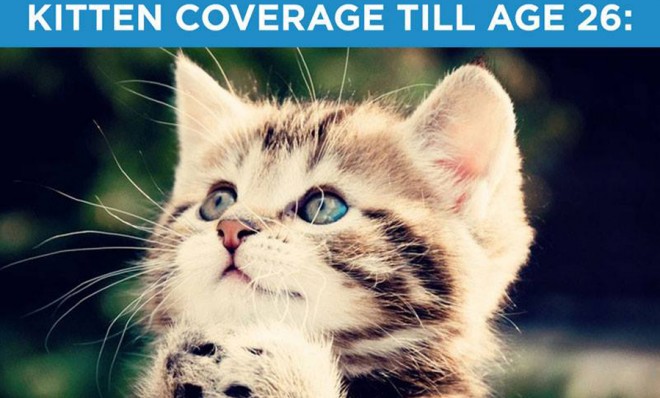Can adorable animals boost ObamaCare?
The Affordable Care Act’s advocates enlist fluffy ducklings and furry piglets to help sell the law

A free daily email with the biggest news stories of the day – and the best features from TheWeek.com
You are now subscribed
Your newsletter sign-up was successful
Meet the latest warriors in the fight over ObamaCare — a piglet, a row of ducklings, and a dormouse on a swing.
The White House shared two photos of cuddly animals this morning originally posted on the "Adorable Care Act" Twitter and Tumblr accounts. The photos feature a variety of meme-worthy images touting the benefits of the Affordable Care Act, otherwise known as ObamaCare.
"Don’t be a sad panda," says one, over an image of the mournful-looking mammal. "Health insurance marketplaces open in five days!" Another shows a tiny dormouse thinking to itself, "I can rest easy knowing that lifetime caps on health coverage have been eliminated!"
The Week
Escape your echo chamber. Get the facts behind the news, plus analysis from multiple perspectives.

Sign up for The Week's Free Newsletters
From our morning news briefing to a weekly Good News Newsletter, get the best of The Week delivered directly to your inbox.
From our morning news briefing to a weekly Good News Newsletter, get the best of The Week delivered directly to your inbox.
Despite the White House’s endorsement, it’s not entirely clear yet who is behind the "Adorable Care Act" meme. The Department of Health and Human Services has not confirmed or denied creating it. But what is clear is that this is only the latest attempt to get millennials buzzing about the law.
The success of ObamaCare rests on at least 2.7 million young, healthy 18 to 35-year-olds enrolling in the law’s marketplace exchanges, which open for business next week. If a majority of millennials decide paying the small fine for refusing to obey the healthcare law’s mandate ($95, in the first year) is a better deal than shelling out for insurance, premiums will go up for everyone else.
Conservatives have already attempted to harness the popularity of social media to convince millennials that ObamaCare is a bum rap. Anti-ObamaCare group Generation Opportunity attempted to create a viral video of Uncle Sam preparing to give young citizens a rectal exam, while the Heritage Foundation sponsored a post on Buzzfeed written in the site’s alt-language of pop culture gifs and sentence fragments.
Whoever is behind the Adorable Care Act meme clearly hopes to attract the attention of today’s cynical youth with the ne plus ultra of shareable content — cute animal pictures. The hope, no doubt, is that the images will achieve a measure of virality that ordinary spreadsheets and pamphlets cannot. Only about a quarter of Americans understand exactly what’s in the act, said James Hamblin in The Atlantic:
A free daily email with the biggest news stories of the day – and the best features from TheWeek.com
Maybe this sort of campaign could be effective in engaging a wider audience — in which case, it could be one of those things that looks silly and trivial but isn’t. [The Atlantic]
But if there’s one thing that young people know, it’s when they’re being pandered to. And — with apologies for the regrettable pun — this could end up being one sad pander:
Dan Stewart is a senior editor at The Week magazine. Originally from the U.K., he has been living in the United States since 2009.